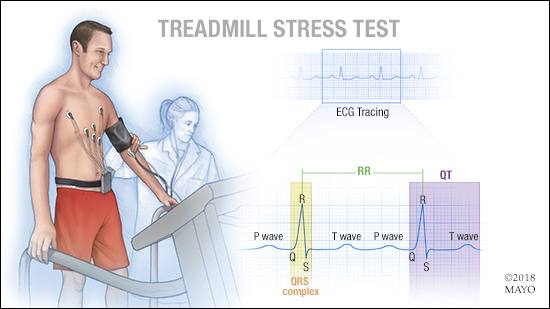-
Mayo Clinic Q and A: Exercise stress test to diagnose heart issues
 DEAR MAYO CLINIC: I have a treadmill stress test scheduled to look for heart disease. I know this involves exercising, and I’m worried that I’m not physically up to it. Is there another way to gather this information?
DEAR MAYO CLINIC: I have a treadmill stress test scheduled to look for heart disease. I know this involves exercising, and I’m worried that I’m not physically up to it. Is there another way to gather this information?
ANSWER: Yes. There’s another way to conduct a heart stress test that doesn’t involve exercise. Several drugs can be safely used to mimic the effects of exercise or stress on the heart. This is known as a pharmacological stress imaging study. However, pharmacological stress testing usually is used only when an exercise stress test can’t be performed due to exercise-limiting problems, such as musculoskeletal problems or poor lung function, and in instances when the resting electrocardiogram (ECG) has certain baseline abnormalities or is considered to be non-diagnostic.
A treadmill stress test provides information about your heart function during exercise. Because exercise makes your heart pump harder and faster and more vigorously than it does during most daily activities, the test may be able to reveal problems within your heart that might not be noticeable otherwise.
If you can walk for more than five minutes on flat ground or up one to two flights of stairs without needing to stop, you can most likely exercise enough to participate in a treadmill stress test.
An exercise stress test is preferable to one using drugs. Compared with a pharmacological stress imaging study, an exercise ECG stress test:
- Provides different information with which to assess the condition of your heart and cardiovascular system
In addition, it provides health care providers with information on your exercise heart rate, rhythm or any abnormalities — as measured by an ECG. It also enables health care providers to see if exercise reproduces any heart or lung symptoms, and how exercise affects other aspects of your cardiovascular system, such as blood pressure and blood flow. - Measures your ability to exercise at varying levels
It’s predictive of cardiac outcomes, and exercise duration is strongly associated with the risk of coronary events and death. - Often doesn’t require any imaging, such as a cardiac nuclear scan or ECG to be done in conjunction with the test, since the ECG tracings are often sufficiently informative
Still, imaging studies are frequently performed with an exercise stress test, when needed. - Is less expensive and takes less time
In addition, the drugs given to mimic exercise or stress can have side effects of their own.
If the treadmill is a barrier — perhaps because of balance issues or knee arthritis — then other forms of exercise often can be substituted. Exercise bikes are often available as alternatives to the treadmill. (adapted from Mayo Clinic Health Letter) — Dr. J. Wells Askew III, Cardiovascular Diseases, Mayo Clinic, Rochester, Minnesota







